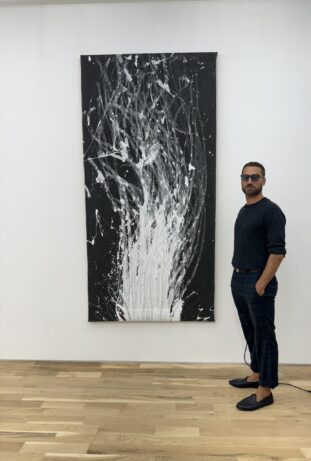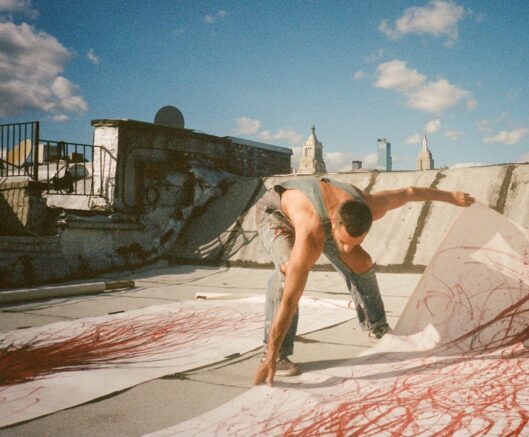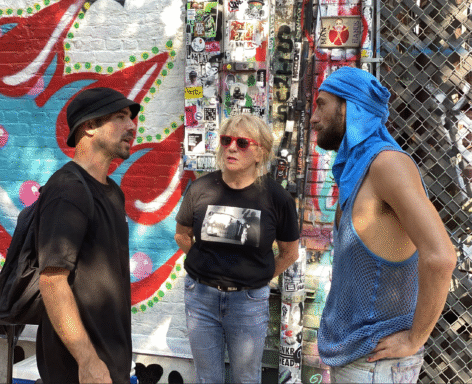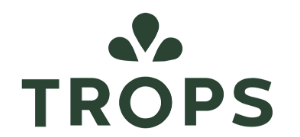Eli Reed is an artist and professional skater who's made his mark in both worlds. By skating into canvases, he blends the two art forms, making for an innovative symbiotic relationship. Born in Massachusetts, he now resides in NYC , evolving his skateboarding journey into a vehicle for creative culture.
Samantha Chevez: When did you start skateboarding?
Eli Reed: I've been skating since I was 10, so that would be almost 30 years ago. Somewhere around 95.
Your gesture is unique in that you translate skate "marks" into gesture on canvas. When and how did you begin connecting skate and art?
I was always around art and made art when I was a kid. I was just super active and leaning into sports. I was such a physical person that skateboarding gave me more freedom than any sport. Because in art, a lot of it should be about freedom. Skateboarding gave me more freedom. It was calling me in that direction to skateboard. And the way I skated was always in a more creative way. And it synced up with seeing it as an art ever since I was a kid. But to be more literal, in 2017, I made my first skateboard paintings. I also had a lot of conceptual ideas and performance art ideas about skateboarding for a long, long time. So it was kind of always festering in me in a sense. But I have a lot of different ways to view skating.

Eli Reed at Trops Emerging Movement, 2024

Eli Reed creating skate paintings in NYC, courtesy of the artist
Do skating and art connect?
Yes. A lot of skaters are around artists and graffiti writers. To connect it so thoroughly, like painting with your skateboard, is something experimental.
What is the significance of your work and how does it connect with skating?
There's something miraculously special about skateboarding. I’m going back to the drawing board with a skateboard as a tool. As a pro skater, you master the movements of skating for so long. I can document them and find out that there's an iconography of symbols within the movements that I do that could look like minutia to some people, but they go back to fractal geometry of the shapes that govern all energy and matter. If I do a 360-pivot with wheels, it would be like a perfect circle. And so it's going back to the question of, “what is skateboarding?” It becomes my own investigation. The significance is the investigation into the movements of skateboarding.
When do you know a work is "Complete" ?
I don't think it really ever is. You never really know. As far as working on a canvas, knowing when to stop, you're looking for some kind of unified symmetry and mark making. I'd say you're never done. When it comes to a canvas or making a piece of work, that's always the question.
You capture the energy of movement in your pieces. Do you plan beforehand how a piece will look, or are you focusing on the skating and improvising the painted marks?
It's not necessarily an abstract expression, what I'm doing. It's a bit more precise because I understand what I'm doing as far as the movements and what that mark is gonna look like. I am documenting a certain experience that's more specific to what the movements are and understanding what different moves you can do on a skateboard, what that mark is gonna make. So while not an abstract expression of an emotional thing, I'm still expressing myself.
I don't really connect with that way of making art. Imagine painting with your feet versus a skilled hand. I can paint with my board, but it's because I have 30 years of experience with skateboarding. So therefore, I can say this is my tool. There's a lot of knowledge already for me to know what marks to make– not only have I been skating for so long, but I've also been skate painting for a long time, so I know what kind of marks I'm making. Although I do have a lot of control, I can't exactly say where it's gonna go, which is the beauty in it. It might not always agree with my idea of what I wanted, but I think that's a good thing.
Do you have any inspirations for your art?
Yeah, there's a lot of great artists that I look to. But I'm simple, all the inspiration that you grab every day from your real life.
What is your personal philosophy towards the creative process?
You can't push creativity, you have to harness it. One day at a time.
Describe a day in the studio. Is there any ritual or preparation you do to "get in the zone"?
To get in the zone, it's more in the doing. Being in the doing as much as you can, so focusing on the things you want and just picking up and doing it.

Eli Reed's paintings at Trops Unruly Vibrations, 2021
How has your perspective on skateboarding changed since you got started and how does it translate into your work?
When you get on a skateboard, you generally know nothing about skateboarding, right? You're just in an experience of trying to get on something with four wheels and either falling or wiping out or rolling and getting thrilled by this scary sensation. So it was more like a sensation-based experience. So I'd say following that thread of an experience was where it started. And then to go through the ringer of there's so many different levels to be getting sponsored or having a career or becoming a professional skater to what I'm doing now has kind of opened up my own lane to where I'm recording the movements, seeing all this iconography and skateboard language again, to a different experience. I can have my own language and dialogue within skating that has nothing to do with what anybody's done before as far as the classical physicality of shooting photos and filming skateboarding. It can be experienced like that or documenting skateboarding in that way.
What is the most rewarding moment of your experiences with skateboarding?
The most gratification in skateboarding is when you land a trick that you've been trying forever– there's an immediate gratification that you can’t put into words. And that might be similar to when you're finished with a painting and you see it hanging up on the wall– that’s how that feels. So I say the moment things come together is the most rewarding.

Eli Reed in NYC @eli_reed
What is the Trops for you?
I think the Trops is a great community-based organization where a lot of artists come together and kind of bounce their creativity off each other. I think point blank the thing that's best about it is that it becomes a creative community. And that's important in today's world to have not just something that's a gallery or a show, but like a community that people can burst and bounce ideas off and philosophize together and have fun and play.
What are you working on these days?
I have an upcoming show at the Casa del Popolo.
Do you have any advice for aspiring artists?
If you have an idea, you should follow it. If you're curious about something, you should follow it. And don't second guess. Sometimes that second guessing part of you can ruin an idea or creative vision. Sometimes you gotta try something, even if it feels ridiculous to just go after that and see where it takes you. Because you never know.
